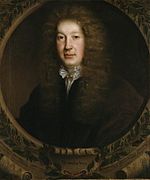
Henry Purcell was an English composer.
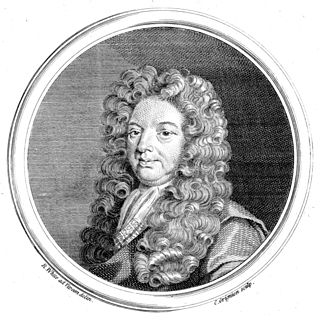
John Blow was an English composer and organist of the Baroque period. Appointed organist of Westminster Abbey in late 1668, his pupils included William Croft, Jeremiah Clarke and Henry Purcell. In 1685 he was named a private musician to James II. His only stage composition, Venus and Adonis, is thought to have influenced Henry Purcell's later opera Dido and Aeneas. In 1687, he became choirmaster at St Paul's Cathedral, where many of his pieces were performed. In 1699 he was appointed to the newly created post of Composer to the Chapel Royal.
Master of the King's Music is a post in the Royal Household of the United Kingdom. The holder of the post originally served the monarch of England, directing the court orchestra and composing or commissioning music as required.

Saint Cecilia, also spelled Cecelia, was a Roman virgin martyr and is venerated in Catholic, Orthodox, Anglican, and some Lutheran churches, such as the Church of Sweden. She became the patroness of music and musicians, it being written that, as the musicians played at her wedding, Cecilia "sang in her heart to the Lord". Musical compositions are dedicated to her, and her feast, on 22 November, is the occasion of concerts and musical festivals.

Ode for St. Cecilia's Day is a cantata composed by George Frideric Handel in 1739. The title of the cantata refers to Saint Cecilia, the patron saint of musicians. The premiere was on 22 November 1739 at the Theatre in Lincoln's Inn Fields, London.
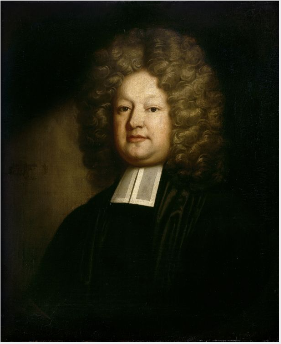
Nicholas Brady, Anglican divine and poet, was born in Bandon, County Cork, Ireland. He was the second son of Major Nicholas Brady and his wife Martha Gernon, daughter of the English-born judge and author Luke Gernon ; his great-grandfather was Hugh Brady, the first Protestant Bishop of Meath. He received his education at Westminster School and at Christ Church, Oxford; he had degrees from Trinity College, Dublin
Fables, Ancient and Modern is a collection of translations of classical and medieval poetry by John Dryden interspersed with some of his own works. Published in March 1700, it was his last and one of his greatest works. Dryden died two months later.
The year 1691 in music involved some significant events.

Hymn to St Cecilia, Op. 27 is a choral piece by Benjamin Britten (1913–1976), a setting of a poem by W. H. Auden written between 1940 and 1942. Auden's original title was "Three Songs for St. Cecilia's Day", and he later published the poem as "Anthem for St. Cecilia’s Day ".
Hail! Bright Cecilia (Z.328), also known as Ode to St. Cecilia, was composed by Henry Purcell to a text by the Irishman Nicholas Brady in 1692 in honour of the feast day of Saint Cecilia, patron saint of musicians.
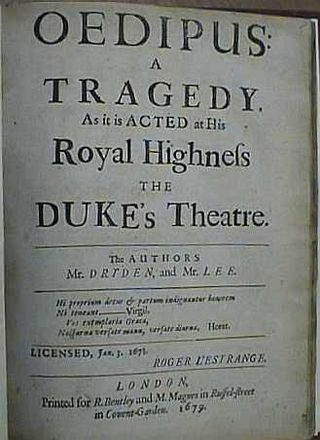
"Music for a While" is a da capo aria for voice, harpsichord and bass viol by the English Baroque composer Henry Purcell.

Alexander's Feast is an ode with music by George Frideric Handel set to a libretto by Newburgh Hamilton. Hamilton adapted his libretto from John Dryden's ode Alexander's Feast, or the Power of Music (1697) which had been written to celebrate Saint Cecilia's Day. Jeremiah Clarke set the original ode to music.
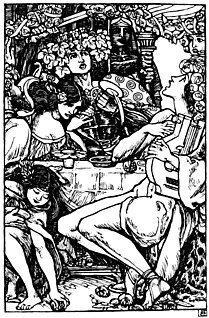
"Alexander's Feast, or the Power of Music" (1697) is an ode by John Dryden. It was written to celebrate Saint Cecilia's Day. Jeremiah Clarke set the original ode to music, but the score is now lost.
Michael Christian Festing was an English violinist and composer. His reputation lies mostly on his work as a violin virtuoso.
Ode for St Cecilia's Day are odes for St Cecilia the patron saint of music and may refer to musical works by:
William Turner was a composer and countertenor of the Baroque era. A contemporary of John Blow and Henry Purcell, he is best remembered for his verse anthems, of which over forty survive. As a singer, he was a Gentleman of the Chapel Royal from 1669 until his death.
Thomas Clayton (1673–1725) was an English violinist and composer, and a member of The King's Musick at the court of William III. His is said to be the first to acclimatise legitimate opera in England.
Welcome to all the pleasures, Z. 339, is a 1683 composition by Henry Purcell, the first of a series he wrote in honour of the patron saint of music, Saint Cecilia. It was commissioned by an organisation called "The Musical Society" for performance in London on 22 November 1683.









